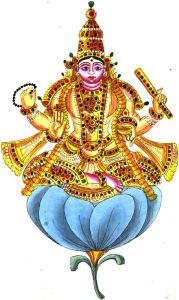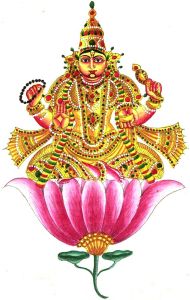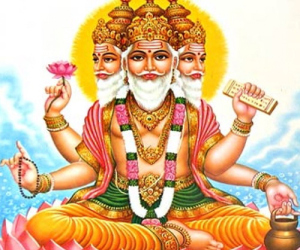Lately I have been thinking often on the idea of remedial measures. How some people get great results from a certain astrological remedy that was suggested in the chart, while others do not get such a good result.
There is this idea in Vedic Astrology that if you have issues you can do an “upaya”, or a corrective action that will fix the problem. The word upaya can be thought of as a means of attaining a goal. So if one wants more money they may do a ritual or mantra practice to Laxmi, a goddess of prosperity and wealth. This is the basic idea. And there is a lot of truth to this idea.
It seems like in the past in some ages the masses were not able to comprehend the higher ideals of the vedic religion and as such the wise sages and Rishis of the time had no choice but to issue a general type of recommendation that would be useful to all. So they gave cut and dried rituals and mantras and practices that could be done and yield some good.
In time these rituals may have gotten embellished with more importance than was true of them. Like mixing up the chaff for the wheat. The chaff is important and protects the grain, but it is the grain that is ultimately the most important. If Sri Yukteswar is right and we are in an ascending cycle this would explain why so many are waking up on this planet and finding a renewed appreciation for jyotish. It therefore makes sense to work on shifting this idea of upaya and remedial measures from a habit of relying on “cut and dried”, general prescription, “one size fits all” approaches to a more alive and intelligently informed formula that is catered to the individual and their needs.
Ayurveda is the same way, where at this time it desperately needs practitioners that are experienced and skilled enough to shift away from the cookbook food lists and into a living and inspired form of medical therapy. One catered exactly to the individual and not to “pittas” or “kaphas” exclusively, since no one is a perfect pitta or kapha type, but a unique mix. I have talked with many Ayurveda experts and practitioners about this and they all seem to feel the same way, wanting to keep the tradition alive and human and not based on following a bunch of rules in a book written by someone who never met the client.
So with all this said, that is what I have been focusing on a lot lately with my practice here at Eye of the Veda. Just trying to find the best remedies and approaches to life for the person. But its quite hard because the chart itself seems to show what will work and not work so well for each person, making it require so much personalization. I have made some recent videos talking about different approaches based on the particular chart in question, as well as showing examples of successful remedial measures that have been applied in peoples lives.
Here is one on the idea of planetary remedies in general.
And here is a video on healing through astrology and how that works. I talk about Rahu and Ketu here as well as they are so important for our healing and balancing of our karma.
And in this video I give some examples of people who have had great experiences from mantras or other remedial measures that I have suggested
I hope these videos and thoughts are helpful and give advice to those who have tried upayas and failed or succeeded, and wondered why. Any upaya is good, but it is better to have an upaya that is intelligently selected for you and not just one suggested for the masses as a whole.


